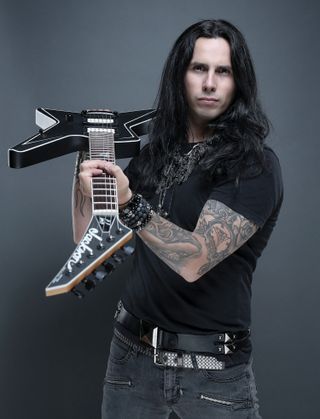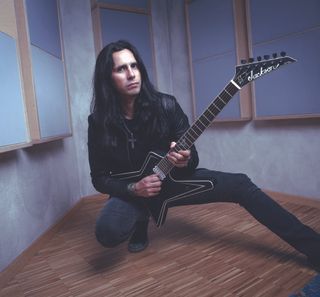
The longtime Firewind guitarist—who spent seven exhilarating years in Ozzy Osbourne’s band—has just released his third solo album, Fearless. But what Guitar World readers really want to know is…
You do an awesome version of Dire Straits’ “Money for Nothing” on your new solo record, Fearless. what made you decide to cover that song? —Alexander Waits
It’s a track I grew up listening to. Songs like this and “Sultans of Swing,” everybody knows that stuff. They were big in Greece. I think they were big everywhere. You’d have to be living under a rock not to know those songs! [laughs] But “Money for Nothing,” it’s such an iconic riff. And I love Mark Knopfler’s playing. So, we had a short list of songs I put together for a possible covers EP, and this one was on it. And then I looked it up on YouTube and I was like, “No one’s really done any cool covers of this.” Not recently, anyways. So we tried it. And then the idea came to me to do the riff on the low E string and play the track at a half-tempo from what it is on the original. We just made a real heavy version of it.
I love shred guitar, but I find it all starts to sound same-y and boring after a while. How do you keep shred interesting? —Ronnie Williams
I have to say, I find shred boring a lot of times, too! If it’s not done with a musical meaning or in some sort of musical context, it’s pretty boring. That’s why I admire guys like Joe Satriani who are able to basically make the guitar take on the role of a voice. But I hate guys who put out stuff that just sounds like backing tracks for them to solo over. That’s why I always try to write songs. Then having a kickass solo is kind of like the cherry on top, so to speak. But you need to have a good song first.
Are there any songs on Fearless that you originally wrote to use with Ozzy Osbourne? —Gene Barksdale
Actually, yeah. The song “Don’t Tread on Me,” I had the music and Ozzy had done a vocal line over it while we were on the road for the Scream tour. Once I stopped playing with him I wanted to do something with the track because I think it’s pretty cool. So I sent it to [vocalist/bassist] Dennis Ward and he did a new vocal line over it and that became the song. Another track is “Mr. Manson,” which is like a Sabbath-y kind of thing. I was planning on showing it to Ozzy but I never got around to it. So I sent it to Dennis and he was inspired to write lyrics. When he sent it to me he said, “Well, ‘Mr. Crowley’ and ‘Perry Mason’ were already taken, so here we go—‘Mr. Manson’!”
How do you feel about Zakk Wylde being back in Ozzy’s band? —James Everett
Well, there’s obviously a long history between those two, so given the fact that Ozzy announced his farewell tour, I think it’s cool. And after Randy Rhoads, Zakk is the most iconic guitar player he’s had in his band. So it’s good that Zakk is coming back. It’s totally fine with me—it’s not like I have a fucking choice! [laughs] But I’m a big fan. And what can I say? I have no complaints because it’s been a hell of a ride for me just playing in Ozzy’s band for seven years. It was never a gig I took for granted. You just have to enjoy it while it lasts. And I’m happy it lasted as long as it did.
Were there any Ozzy songs you found diffcult to play during your time in the band? —Andre Terrial
There were challenging parts here and there. “Killer of Giants,” we used to do that one, and it has a long acoustic intro with a lot of interesting chordal things. There are also some cool note choices in Jake E. Lee’s solo on that one. But technically there weren’t really any difficult situations. For me, the most difficult part was to really play the songs right. Just to play them as close as possible to the originals and do the best I could. Because you don’t want to butcher those songs when all these fans are expecting them to sound like the originals. At least that’s what my approach was. So that was my main concern. But the playing side of things, honestly, that music was what I grew up listening to so I just loved every song, really.
Are there any current or new guitarists out there that you like? —Joe Kianowitz
Man, there’s tons of great guitar talent out there. A couple of years ago I toured with Angel Vivaldi, who I hadn’t heard of before. He’s a DIY guitar player who broke big on the Internet. I heard him play and I was really excited so I hit him up and we did a tour together. I think he’s one of the cool cats around right now on the scene. Who else? Nick Johnson’s pretty cool. And Richie Faulkner from Judas Priest. I like him because he’s the new guy but he also has such an old-school style that fits totally into Priest.
What gear are you using on Fearless? —Lorenzo Mariotti
I mainly used my signature Jackson Star guitars. But I also used some others, like a Charvel Pro-Mod. And on a song called “Big City” I actually used a reissue 1961 Fiesta Red Strat that Fender did in tribute to Gary Moore. They only made 60, and they were built by master builder John Cruz. They’re just phenomenal. I wanted a little bit of that Gary Moore magic on the record so I decided to use it on the song. And I recorded everything with my signature Blackstar Blackfire 200 and an EVH 5150 III Lunchbox. My tone is a combination of those two amps.

During the 2012 Ozzy and Friends tour, you got to play onstage every night with Zakk Wylde and Slash. Was that just completely awesome? —Brian Duran
It was fantastic! To play with some of my guitar icons and jam on all those classic songs, it was just amazing. The other thing was it was very loud onstage. Slash and Zakk—I thought I was loud until I played next to those guys! [laughs] But it was great being up there with them. They were very cool to me and said very encouraging things. It was just a mind-blowing experience.
Are there any bands or artists you love that we wouldn’t expect Gus G to be into? —Jason Storch
Hard to say. Obviously Dire Straits would be one. When it came to “Money for Nothing” somebody said to me, “Yeah, I would have expected that you would do a Michael Schenker or Uli Jon Roth song.” I actually really like this Swedish band called Roxette. They had some big hits in Europe. So maybe I would do a Roxette cover, something like “Joyride” or “Fading Like a Flower,” which has a cool riff. I might do it now! [laughs]
What was the metal scene like in Greece when you were growing up? —Mike Burns
There wasn’t so much going on, to be honest. There were some early black metal bands, like Rotting Christ—guys like that who had been doing it since the late Eighties. But it was unheard of to go out there and get a worldwide record deal or do a tour in Europe or America. When Firewind started, we got a deal with Century Media and we started doing tours in Asia and America and all over Europe and playing festivals, and that opened a lot of doors for the younger generation. Because back then nobody had a lot of information on how to do things, because we didn’t have a big international scene. I really couldn’t even find musicians to play with. I had to go to the States and later to Sweden to form a band.
What’s the weirdest place you’ve ever played? —Nick Shear
Actually, I’ve played some pretty weird gigs in America, I’ll tell you that! In America, touring the club circuit can be really strange. One night you’ll be at a really nice venue and the next night it might be some bar and grill in the middle of butt-fuck nowhere, and people will be sitting down and eating a steak while you’re playing. I don’t know why it’s like that, but, yeah, that’s the club circuit over in the States! But the fans are always nice, so it doesn’t really matter.
Do you prefer playing in a band or being a solo artist? —Peter Carthy
Well, Firewind is my baby. I’ve had it since I was 18 years old. But then it’s also exciting to go out and do a solo record. So if I can do both I like to do both. But when I was younger I was always one of the dudes in the band. Then it turned out that I became the leader of the band because I also had a business mind. I would sort out the logistics and bring in the record deals and talk to the booking agents and all that stuff. Then the solo career sort of happened out of being a little bit frustrated with being in a band. I wanted to put my band on ice for a while, and I found new freedom in being a solo artist. Now they both coexist…in peace! So it’s cool.
What was the first song you learned to play on guitar? —Keith Sohn
I think it was Metallica’s “Nothing Else Matters.” Because everything is on open strings!
Have you ever had an embarrassing moment onstage? —Jerry Swanson
Oh, yeah. A really embarrassing moment for me was when I was doing a gig with Ozzy in Norway. We went out there and opened with “Bark at the Moon,” and there was no sound coming out of my guitar! My tech was going nuts—he didn’t know if it was the wireless or the pedalboard or something else. What it turned out to be was, I had this kill switch on my guitar, like an on/off kind of thing, and apparently I had it set to “off.” So I ruined the whole show intro. It was a real fucking Spinal Tap moment. And it took us like three or four minutes to figure out what was going on. We basically just stopped. I think Ozzy was getting the crowd to sing or telling jokes or something until we fixed the problem. It was not a good situation. I thought he was going to fire me after that, but he was cool about it. He said, “Ah, fuck it! It’s rock and roll, you know?”


